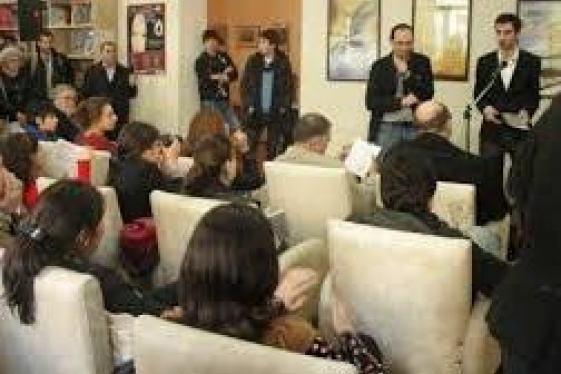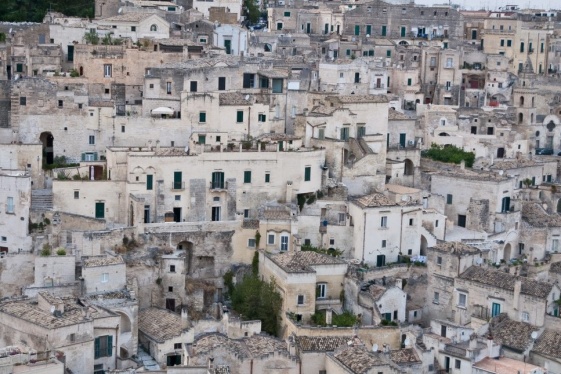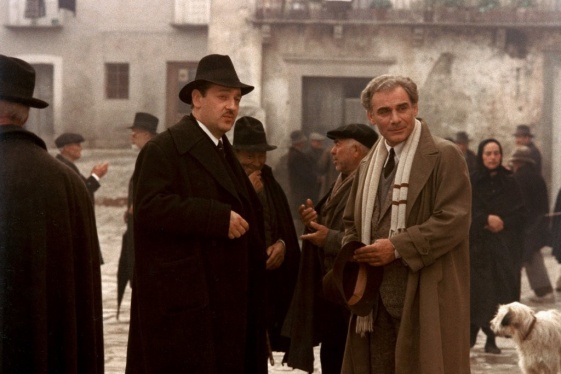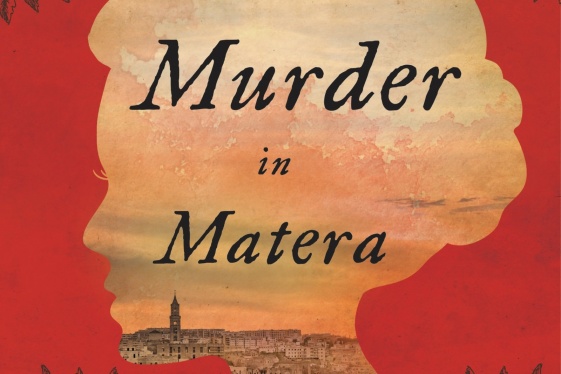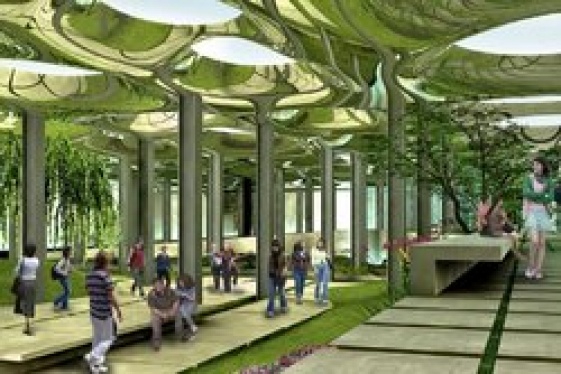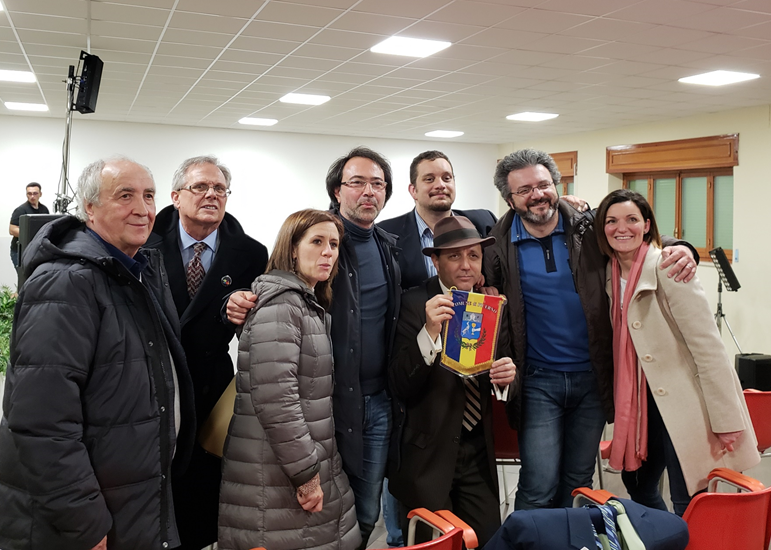

BY: Roberto Ragone
The Vito Marcantonio Forum (VMF) achieved transnational status—a step towards transcendence—for the Italian-American politician known as the People’s Congressman, prego to an invitation to participate in “European Capital for One Day – Picerno: Capital of Human Rights” (“Capitale Europea per un Giorno – Picerno: Capitale dei Diritti”), a conference that took place from April 9 to 11, 2019, in his Italian ancestral home. Picerno is where Vito Marcantonio’s mother, Angelina Dedobitis, was born as were the parents of his American-born father, Saverio Marcantonio.
The Vito Marcantonio Forum was founded on October 3, 2011. Over the ensuing eight years, its goals have been steadily accomplished. Among these successes was the naming, on December 2017, of the northeast corner of the intersection of East 116th Street and Lexington Avenue, “The Vito Marcantonio Lucky Corner.” At this site Fiorello LaGuardia—when he served five terms in Congress for East Harlem from 1922 to 1932 before serving as the greatest mayor in the history of New York City from 1933 to 1945. Congressman Vito Marcantonio, and the candidates endorsed by Marcantonio gave campaign speeches on Election Eve. Both LaGuardia and Marcantonio believed that the ritual of giving campaign speeches the night before Election Day at that location brought them good luck.
The naming of the Vito Marcantonio Lucky Corner represents acknowledgment of the Congressman, his political heritage, and his historical importance in the public sector. This is a symbolically significant act that helped to reverse the historical obliteration of his name and contributions after he died during the anti-Communist hysteria of the 1950s.
News of that “Lucky Corner” achievement reached the Marcantonio family’s hometown of Picerno, in Basilicata in Southern Italy, that triggered a series of communications that concluded with the aforementioned invitation.
The government of Picerno, led by Mayor Giovanni Lettieri and Deputy Mayor Giusy Marisco, obtained funding from the Matera Foundation for a three-day conference featuring academic and artistic presentations about the life and times of Vito Marcantonio. The Conference’s related themes, which were rooted in Italian culture and history, showed the Congressman’s continued relevance to the United States and Italy. Matera, also located in Basilicata, had been selected in 2019 as the European City of Culture in celebration of its historical landmarks and archaeological ruins. in light of this decision , the foundation provided opportunities for local towns within the region, like Picerno, to apply for cultural and historical project funds.
The participation of VMF’s honored member Gary Bono and its co-chair Roberto Ragone was written into the budget.
Some months before plans for Picerno’s conference were finalized, Ragone had performed his one-man show—The Purgatory Trial of Vito Marcantonio—to a sold-out house in New York City. His play garnered significant attention through several online publications of the show’s review.
The conference included a presentation about a book entitled, Etica del Dialogo (The Ethics of Dialogue) by a local author, Gennaro Curcio, which was followed by panelists’ commentary, including Carmine Curcio and Renato Cantore, who was among the first in Picerno to establish contact with the VMF.
The book presentation was held in a historic building where Picerno’s Municipality Council Meetings have taken place, but has now been modernized, for use as a major public venue.
Saverio Romeo, a Picerno-raised, London-based technology consultant (who coincidentally bears the same first name as Marcantonio’s father) gave Bono and Ragone a tour of that same historic building. This occurred during the book presentation. This historical building includes a cinema library, a display of folk artifacts, including traditional dress from the different towns of Basilicata, and gallery space exhibiting art in the impressionist style by a local artist, Giuseppe Faraone.
Romeo interpreted the various presentations and served as tour guide to organizations, exhibits, and landmarks in the area, including a historic monastery overlooking Picerno.
Bono and Ragone encountered townspeople who knew that Marcantonio’s intellectual mentor, Dr. Leonard Covello, also from the Potenza area of Basilicata, came from Avigliano, a town south of Picerno.
One woman informed Ragone, “Vito Marcantonio e il mio bisnonno (great grandfather).”
Romeo also introduced Bono and Ragone to the Associazione Insieme Onlus (Together Nonprofit Organization), administered by Maria Elena Bencivenga, which helps people with physical and mental disabilities. This organization has curated an exhibit explaining important areas of Picerno’s post-World War II history, including the structure of the Italian constitution, the political martyrs who fought against the Mafia in Italy during the same epoch, and the campaign they fostered against organized crime.
Romeo also brought Bono and Ragone to a technical high school, Albert Einstein Technical Institute for Electronics and Telecommunications, administered by Domenico Gravante, and housed in a building constructed with funding from the United States after the devastating earthquake of 1980.
Bono and Ragone took part in a presentation organized by a teacher at the Institute, Dorina Ripullone and Simona Uagli, who interviewed the VMF members for a radio show/podcast.
Bono and Ragone watched a PowerPoint presentation about Marcantonio prepared by students, and a radio interview (using audio and photos) with one student portraying Marcantonio and another student interviewer asking questions about the past and a few miscellaneous questions about the present (for example, “What is your favorite sport?” “Soccer, of course,” replied Marcantonio.)
Students prepared questions for Bono, Ragone, and Dr. Carmine Curcio: a prominent heart surgeon and arts philanthropist who has published a two-part booklet: one part, summarizing parts of Dr. Gerald Meyer’s, Vito Marcantonio: Radical Politician; and the second, a selection of speeches drawn from Annette T. Rubinstein’s, I Vote My Conscience, a compendium of excerpts from Marc’s Congressional speeches, radio addresses, and defenses in court.
The VMF’s ambassadors participated in other activities, including a panel moderated by Cantore, an honorary VMF member, with Bono and Ragone discussing the significance of Vito Marcantonio politically, symbolically, and culturally—to the historical trends of all those in the United States, and Italy, who are seeking a better life for all their categories.
The people of Picerno and, more broadly, the region of Basilicata rebelled against the monarchy in the revolutionary movements of 1799; and in contrast to many other municipalities in the south, voted in favor of the Republic as opposed to a Constitutional monarchy in the plebiscite following World War II.
Panelists even found parallels between Marcantonio’s dedication to public service and the political careers of Antonio Gramsci and Niccolo Machiavelli.
The scholarly panel was followed by a theatrical program that included Ragone dramatizing Vito Marcantonio’s July 1942 speech defending Italian Americans against discrimination during World War II. In this speech, Marcantonio called those who discriminated against Italian Americans and all other minorities of “playing Hitler’s game.” It just so happened that among the selections Dr. Carmine Curcio translated was the speech Ragone dramatized. This facilitated actor Ernesto Luongo’s rendering this discourse in Italian.
Artistic Director/Actor Paolo Curcio and Luongo then performed their sketch with actress, Loredana Marcantonio (no relation), wherein two characters explain to a rather dense third character the importance of Vito Marcantonio.
A second sketch entailed bored elementary and high school students sitting against a wall, beneath a sign saying the street is to be renamed for Vito Marcantonio. They share their limited knowledge until a youngster emerges from behind the wall portraying the young congressman to tell them his own story.
The evening concluded with remarks from the Mayor, who invited Ragone to speak. Ragone revealed that his family is from the other side of the mountains from Picerno, in the Diano Valley, in the Salerno province in the Campagnia region.
He used some of the dialect both regions share. Speaking in a mixture of English, Italian, and the Neapolitan dialect, Ragone said: “Vito Marcantonio was a true progressive connected to the people. He wasn’t like some contemporary, elitist liberals that my parents would probably call ‘chiarfuzzi’ (snot noses) – ‘la gente con il nazo a l’aria’ (the people who’ve got their noses up in the air).”
The last day, Luciano Figliuolo and Prospero Carella, who had picked up Ragone and Bono at the airport, escorted them on a tour of Matera. This remarkably well-preserved town with a Biblical essence that served as a set for Mel Gibson’s film, The Passion, produced in 2004, and Pier Paolo Pasolini’s, The Gospel According to Matthew, produced in 1964.
More importantly, Matera was featured in Carlo Levi’s Christ Stopped at Eboli – a loosely autobiographical novel that promoted a scandal that caused the Alcide De Gasperi Administration to remove people living in caves without electric light and running water to homes made for human beings. Levi’s work exposed the scandal as did his sister, a doctor in Torino. Many of the impoverished locals’ families have resided there for decades (perhaps centuries), but were moved to modern housing elsewhere in the town. In the 1960s this history became the focus of preservation and tourism efforts. These efforts led to UNESCO citing Matera’s great significance. When we arrived in Matera, we encountered that there was an exhibit space showing the paintings of Carlo Levi in Matera not far from the entrance to the ruins.
The visit to Picerno is not only part of a campaign of vindicating Vito Marcantonio as the unsung hero eradicated from history, but also one that validates the investment in emotion, intellect, time, and energy by members of the Vito Marcantonio Forum, which is dedicated to disseminating and sharing knowledge of the life and work of Vito Marcantonio and his mentors, Fiorello La Guardia and Dr. Leonard Covello. The VMF has striven to correct the historical record, which most often has ignored or misrepresented Marcantonio’s unceasing work on behalf of those left out of the American Dream The VMF applauds his courageous fight for a more authentically democratic United States of America and in the invaluable and important frame of reference for coalition-building.
The Vito Marcantonio Forum appreciates the hospitality of the people of Picerno, and the people of Picerno feel the same way about having advocates in the United States. As knowledge of Marcantonio grows globally, other interested parties will emerge who appreciate the universal application of his humane brand of politics.
SOURCE: https://vitomarcantonioforum.com/
You may be interested
-
''La Gente di Mulberry Street'' presentato a...
Valsinni- Italia, terra di emigranti. Presentato a Valsinni il nuovo saggio storico di Raf...
-
‘Bond 25’ Gears Up for Shoot in Matera, in So...
Casting for the new James Bond movie is still under way, but a prominent part is set to be...
-
‘Christ Stopped at Eboli’: An Italian Saga Re...
Carlo Levi’s memoir, “Christ Stopped at Eboli,” was a literary sensation in post-Fascist I...
-
‘Murder in Matera’ review: Helene Stapinski i...
There’s an expression that weaves its way through Helene Stapinski’s union of crime story...
-
"Storie di emigrazione lucana": aperto il ban...
"Storie di emigrazione lucana" è il titolo del concorso video rivolto ai singoli studenti,...
-
"Terra Lucana" - video poetry that pays homag...
Born from an idea by Sergio Ragone and Omar Gallo, and created by the award-winning direct...
-
”On the road to Little Lucania” un docu-film...
“On the road to Little Lucania”: il docu-film, realizzato da Suditaliavideo con il contrib...
-
«Così costruirò il primo parco sotterraneo de...
di Alessandro Frau Ho scoperto la storia di Lowline, e di Dan Barash, una settima...



